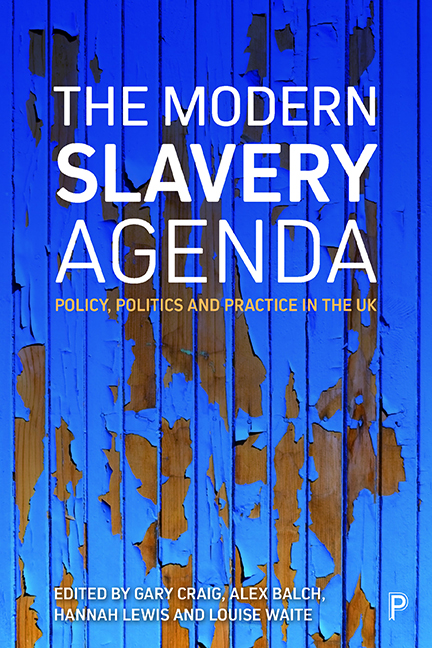Book contents
- Frontmatter
- Dedication
- Contents
- List of tables, figures and boxes
- Notes on contributors
- Editorial introduction: the modern slavery agenda: policy, politics and practice
- one Modern slavery in global context: ending the political economy of forced labour and slavery
- two The UK’s response to modern slavery: law, policy and politics
- three Defeating ‘modern slavery’, reducing exploitation? The organisational and regulatory challenge
- four Class Acts? A comparative analysis of modern slavery legislation across the UK
- five Child trafficking in the UK
- six Human trafficking: addressing the symptom, not the cause
- seven Still punishing the wrong people: the criminalisation of potential trafficked cannabis gardeners
- eight Modern slavery and transparency in supply chains: the role of business
- nine Migrant illegality, slavery and exploitative work
- ten The UK’s approach to tackling modern slavery in a European context
- Index
three - Defeating ‘modern slavery’, reducing exploitation? The organisational and regulatory challenge
Published online by Cambridge University Press: 20 April 2022
- Frontmatter
- Dedication
- Contents
- List of tables, figures and boxes
- Notes on contributors
- Editorial introduction: the modern slavery agenda: policy, politics and practice
- one Modern slavery in global context: ending the political economy of forced labour and slavery
- two The UK’s response to modern slavery: law, policy and politics
- three Defeating ‘modern slavery’, reducing exploitation? The organisational and regulatory challenge
- four Class Acts? A comparative analysis of modern slavery legislation across the UK
- five Child trafficking in the UK
- six Human trafficking: addressing the symptom, not the cause
- seven Still punishing the wrong people: the criminalisation of potential trafficked cannabis gardeners
- eight Modern slavery and transparency in supply chains: the role of business
- nine Migrant illegality, slavery and exploitative work
- ten The UK’s approach to tackling modern slavery in a European context
- Index
Summary
Introduction
Are political promises to eradicate modern slavery, and to stamp out the criminals that Theresa May referred to as ‘slave-drivers’ (May 2017), empty and doomed to fail? Will they do nothing to reduce severe forms of exploitation? This would be the likely verdict of a growing group of scholars and activists who reject the political agenda on modern slavery, dismissing the UK's approach from first principles and denouncing it as reactionary and undermining human rights (O’Connell Davidson 2010, 2015). Others have questioned the appropriateness of the language of slavery (Dottridge 2017), rejecting, in particular, the equation with the historical (transatlantic) slave trade (Beutin 2017). This chapter focuses on the more practical question of the agenda's implementation and its effectiveness in addressing labour exploitation. It explores the shift from the pre- to the post-Modern Slavery Act (MSA) era. It examines the new enforcement practices and regulatory system in the context of the institutional and organisational environment that preceded it.
A significant indication of some of the problems of delivery was given by the recent National Audit Office (NAO 2017) report regarding the UK's strategy on modern slavery. This concluded that, in its current form, the system would be unlikely to achieve its main aim of significantly reducing modern slavery. It also noted the allocation of increasing funds, the growing thousands of individuals identified as victims and offered support, and the creation of a panoply of advisory bodies and stakeholder forums to execute the government's aim to eradicate it. The question, then, becomes: what difference does the MSA, and associated policy, make, and to whom? To begin answering this question, we need to work out how to assess the main innovations and distinguish between the key outputs and outcomes of the modern slavery agenda, the former being the actions of government, the institutions created and the policy changes announced, and the latter being the effects of these actions. Only in this way, it is argued, can we place the new system against the criticisms and failings that beset previous approaches designed to tackle human trafficking (eg ATMG 2010, 2013).
The focus here is the system of regulation and enforcement constructed around modern slavery, and the wider context of the UK labour market perspective. This is slightly different from the NAO approach, which assesses the policy on its own terms.
- Type
- Chapter
- Information
- The Modern Slavery AgendaPolicy, Politics and Practice in the UK, pp. 75 - 96Publisher: Bristol University PressPrint publication year: 2019



